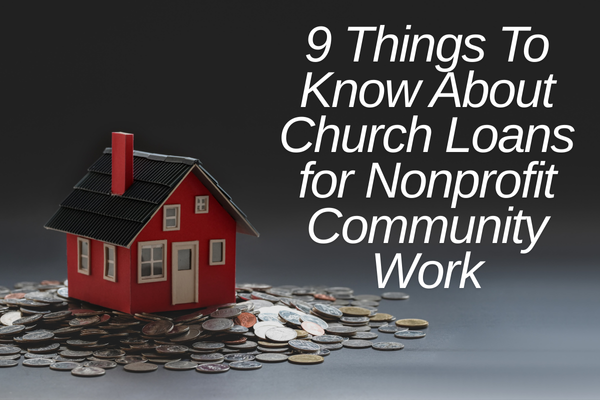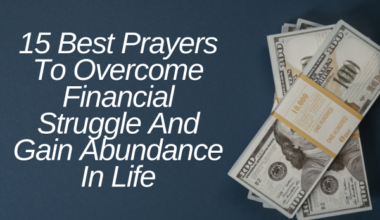If you are looking to get a loan for your Nonprofit community work, here are 9 things we would want you to know. Understanding what is involved, will help you to ascertain the kind f loan you want to access. Remember, when churches engage in nonprofit community work, securing the right loan can provide the necessary financial support to help bring these initiatives to life. Church loans specifically designed for nonprofit community work are essential for funding projects that benefit the local community, whether through education, healthcare, social services, or outreach programs.
What You Need to Know About Church Loans for Nonprofit Community Work
However, understanding the key factors involved in these loans can help churches make informed decisions and successfully carry out their mission. Here’s what you need to know about church loans for nonprofit community work:
1. Types of Church Loans for Nonprofit Community Work
Church loans for nonprofit community work can be categorized into several types, depending on the nature of the project and the church’s financial needs. Here are some common types:
- Construction Loans: These loans are used for building or renovating church facilities that will serve as community hubs for social services, outreach programs, or educational initiatives.
- Equipment Loans: These loans help churches purchase equipment needed to run community programs, such as computers for a learning center or medical equipment for a health outreach initiative.
- Program-Specific Loans: These are smaller loans intended to fund specific community programs, such as food banks, after-school care, or addiction recovery services.
- Line of Credit: A line of credit can be used to cover operational costs and is particularly useful for ongoing community initiatives that require flexible financing.
Why It Matters: Understanding the different loan types available ensures that churches choose the one best suited to the specific needs of their nonprofit work, whether it’s for a new building, a particular program, or the purchase of necessary equipment.
2. Loan Eligibility for Nonprofit Church Projects
Eligibility requirements for church loans can vary based on the lender and the type of loan. Generally, churches will need to demonstrate that they are nonprofit organizations with a mission to serve the community. Key eligibility factors include:
- Nonprofit Status: Most lenders require the church to be registered as a 501(c)(3) organization, or the equivalent nonprofit status in their country.
- Financial Health: Churches will need to show that they are financially stable and able to repay the loan. This can include providing financial statements, income and expense reports, and a plan for the project.
- Community Impact: Lenders often look for evidence that the proposed project will have a positive impact on the local community and align with the church’s mission and values.
Why It Matters: Understanding eligibility criteria ensures that churches can effectively meet the requirements for securing a loan, minimizing delays in the loan application process.
3. Interest Rates for Church Loans
Interest rates are a key factor in determining the overall cost of a loan. Church loans typically offer lower interest rates than conventional business loans because faith-based organizations are considered less risky, especially when they have a proven track record of serving the community.
- Fixed vs. Variable Rates: Many church loans offer fixed rates, providing predictability in repayment. Some lenders may offer variable rates, which can fluctuate over time but may start with a lower rate.
- Subsidized Interest Rates: Some lenders or nonprofit-focused financial institutions offer subsidized interest rates for churches engaging in community service projects, which can reduce the cost of borrowing.
Why It Matters: Understanding interest rates helps churches budget for the loan and avoid unexpected financial strain. A lower rate means the project can be completed with fewer costs over time.
4. Repayment Terms and Flexibility
Repayment terms for church loans can be flexible, but they depend on the nature of the project and the financial capacity of the church. Flexible terms can make it easier for churches to manage cash flow, especially since community work often involves inconsistent revenue streams.
- Grace Periods: Some loans come with grace periods, where repayment does not begin immediately after the loan is disbursed. This can be particularly helpful for large projects that take time to complete, such as building a community center or setting up an ongoing outreach program.
- Repayment Schedules: Churches can often negotiate repayment schedules that align with their cash flow, whether that means monthly, quarterly, or annual payments.
Why It Matters: Flexible repayment terms can ease financial pressure and give the church time to establish or expand the community program before starting to repay the loan.
5. Collateral Requirements
Many church loans, especially larger ones, require collateral. This could be church property, assets, or future income generated from community programs. Collateral serves as security for the lender, and if the church is unable to repay the loan, the lender can seize the collateral.
- Real Estate as Collateral: Church property, such as land or buildings, is often used as collateral for larger loans, particularly for construction or renovation projects.
- Unsecured Loans: Some lenders may offer unsecured loans or lines of credit, particularly for smaller projects. These loans may have higher interest rates due to the higher risk to the lender.
Why It Matters: Understanding collateral requirements helps churches assess whether they are comfortable with the risk of putting up assets, and ensures they have the necessary resources to meet the loan’s security requirements.
6. Loan Terms for Specific Nonprofit Initiatives
Church loans for nonprofit community work often come with terms specifically designed to support the church’s social impact goals. For example:
- Program Financing: Loans for specific community programs might have terms that allow the church to use the funds for program-specific needs, such as staff salaries, materials, and overhead costs.
- Revenue-Generating Projects: If the project is expected to generate revenue (for instance, a community-run cafe or a health clinic), lenders may allow the church to use those proceeds to help repay the loan.
- Reporting Requirements: Some lenders require churches to demonstrate the social impact of their projects, through regular reports or progress updates. These reports may detail the number of individuals served, improvements in community well-being, or other measurable outcomes.
Why It Matters: Loan terms tailored to specific nonprofit work ensure that churches can use the funds effectively, with appropriate accountability and support for their community initiatives.
7. Tax Exemption and Loan Considerations
Churches typically benefit from tax-exempt status, which can influence loan terms and the overall cost of borrowing. Understanding how tax exemption interacts with church loans is crucial for determining whether the loan can be structured to optimize savings.
- Tax-Deductible Interest: In some cases, interest paid on a loan for nonprofit purposes may be tax-deductible, helping reduce the overall cost of the loan.
- Tax-Exempt Status Impact: Some lenders offer tax-exempt status-related loans with more favorable terms, recognizing that churches are not-for-profit organizations.
Why It Matters: Churches can maximize financial savings by understanding how their tax-exempt status can benefit the loan terms and overall project costs.
8. Finding the Right Lender
The best lenders for church loans for nonprofit community work are those with experience in working with faith-based organizations and a strong understanding of nonprofit funding.
- Faith-Based Lenders: Many financial institutions specialize in church loans and understand the unique needs of faith-based organizations. These lenders are typically more flexible and offer terms that align with the church’s mission.
- Nonprofit-Focused Lenders: Some nonprofit-focused lending institutions and community development financial institutions (CDFIs) offer loans with favorable terms specifically for social impact projects.
- Local Banks and Credit Unions: Some local banks and credit unions offer church loans or lines of credit, especially if the church has an established relationship with the institution.
Why It Matters: Choosing the right lender ensures that the loan aligns with the church’s mission and financial situation. A lender with experience in nonprofit community work can offer better guidance and tailored terms.
9. Grant and Loan Combo
In some cases, churches may be eligible for a combination of loans and grants to fund nonprofit community projects. Many faith-based organizations qualify for grants from local governments, foundations, or nonprofit organizations to support their community work. These grants may be used alongside loans to reduce the overall borrowing burden.
- Grant Applications: Churches should explore local and national grant opportunities that align with their community mission, especially those related to social services, education, or healthcare.
- Loan/Grant Partnerships: Some lenders may allow a portion of the loan to be forgiven if the church is able to secure matching grants or other funding sources for the project.
Why It Matters: By combining grants with loans, churches can reduce their borrowing needs and increase the overall impact of their community project.
Conclusion
Understanding church loans for nonprofit community work is essential for churches looking to expand their impact in their communities. With the right approach, loans can become powerful tools to fund projects such as outreach programs, housing support, educational initiatives, and health services. By learning about the different loan types, evaluating terms, and preparing solid financial plans, churches can make informed decisions that align with their mission and goals.
Additionally, considering low-interest options, faith-based lenders, and sustainable repayment plans ensures that churches remain financially secure while serving their communities. Armed with these insights, churches can effectively leverage loans to fulfill their nonprofit mission and drive positive change.



